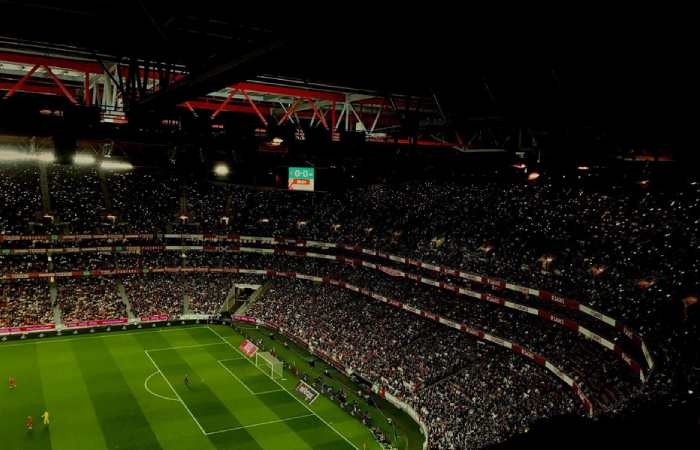Toxic Fandom: Football is a prime example of a sport that evokes profoundly strong feelings such as pride, heartbreak, and euphoria. Children and adults alike have no problem feeling and displaying emotion for their favorite football teams, often creating a sense of global community. As much as football brings people together, it also has the possibility of breaking people apart when not handled properly.
There is no shortage of Twitter altercations and brawls in the stands of stadiums, but in more recent years, there appears to be an increase in incidents of anger towards supporters. This social change is actually more common than people realize and falls under the category of toxic fandom. Fans strive to have control, use aggressive language, and try to control the narrative to outline their assumptions of what lies outside the turf.
Who Fuels the Toxic Turn?
The sociocultural aspects of football, unlike any other sport, tend to incur emotional involvement. Such tendencies, coupled with supporting clubs as personal identity brands, breed intense emotional reactions when things go south – players underperform or teams lose. Beyond customary fandom, secondary digital ecosystems – especially sports wagering platforms and casino games online – serve as multifaceted but often amusing spaces. Those platforms allow fans to actively participate for the entire duration of the match, crafting skillful engagement even beyond the traditional 90-minute timeframe while rollercoastering the experience.
But in stark contrast to the excitement offered, the emotional turmoil bound to arise from clashing expectations can greatly increase tension within already passionate communities. Mid-2024 fanned the flames of the clash between Real Madrid and Manchester City fans after the Champions League semifinal, and the heated rivalry reached fever pitch during the tense second leg. Seething supporters flooded social media with unabashed vitriol directed not just at referees and opposition players, but at their own team personnel as well. Moderating the fan diatribes about tactics quickly devolved into racial slurs and threats, revealing just how easily zealots turn to violence.

Arsenal vs. Raya Controversy
In March 2025, the focus of the world was on Arsenal’s title chase, which was being followed closely by much of the world, which was bizarre. Their primary keeper, David Raya. Made a catastrophic blunder in the match against Brighton, which ended in a 2 – 2 draw. Considering his performance throughout the season, Raya was harshly labeled a scapegoat. Furthermore, he was subjected to vitriolic Instagram comments, and his fan forums went so far as to concoct elaborate theories that he intentionally sabotaged the match to impede the title chase.
In a maddening crowd, the number of betting accounts and their affiliate accounts filled with emotional and complaining posts surged. Several accounts discussed losing bets. But the heated conversations condemning these morons who openly gambled online took a decisively hostile tone.
Without undergoing due diligence, mainstream media picked up the story and began sensationalizing it. In this instance, ‘toxic fandom’ captures not only the overwhelming sentiment. But a narrative allowing blame and outrage to spiral uncontrolled.
Why Influencer Culture Is Responsible
The world of football and influencer betting has remarkably transformed. Dramatic rants and over-exaggeration are bound to go viral and capture enormous follower counts. Influencer networks like Melbet India Instagram offer influencers a chance to broadcast their opinions and provide live. Exclusive betting tips during matches, which is very engaging. These platforms bridge the gap and enhance the connection between the sport and its followers by developing a more passionate audience.
An influencer provided their take on a game during India’s domestic league playoff in September 2024. This particular take, controversial as it was, caught tremendous attention, violently critiquing a referee’s penalty call as one-sided. The influencer’s tipping point was their huge following because of the support they got from fans who were equally jealous of their love for the game. The aftermath was outrage, but also highlighted how far football content can go using social media in order to get new people into the game and later strengthen the community.
How Toxicity Affects the Game
The irreparable harm that an unwarranted toxic fandom brings is not only psychological in nature—it impacts the way clubs, players, and even broadcasters operate. Because of such extreme cyberbullying, teams have begun using reputation repair firms, and players now require exposure avoidance instructions.
Such conditions increase the pressure on young, exceptionally gifted, and underrepresented players who are more likely to be perceived as convenient targets. A player’s performance encompasses much more than just the pitch; additional expectations include participating in goal celebrations. Social media, and maintaining an active online presence. As a result. The integrity of the sport suffers because the dominant emotion is fear instead of joy, while the dominant practice is not free expression, but strategy.
Table: Effects of Toxic Fandom Across Stakeholders
| Stakeholder | Type of Impact | Long-Term Consequence |
| Players | Mental health strain | Reduced performance and burnout |
| Coaches | Tactically conservative decisions | Reduced innovation in strategy |
| Clubs | PR crises and reputation damage | Increased resource allocation to crisis management |
| Broadcasters | Content sanitization | Less authentic commentary |
| Fans | Polarized communities | Erosion of mutual respect |

Common Triggers Behind Aggression
Fans may tend to exhibit aggression as a result of the following:
- Hostile outbursts typically arise from some form of conflict. Addressing the attending causes can lead to better-organized societies, in this case, fans.
- Disrespect from players (e.g., not thanking supporters for coming after the match, especially after a loss)
- Disputed officiating in important matches
- Club owners openly stating things that do not align with the support
- Any loss, financial or emotional, linked to the outcome of betting
- Self-contained groups perpetuated by sponsoring biased personalities or media coverage
Toxic fandom is more than just misplaced fervor. It showcases the storm that is brewing in a sport that keeps getting globalized and commercialized. Examining the roots. Manifestations, and impact enables fans, players, and organizations to transform football culture—to shift from dividing to uplifting.

